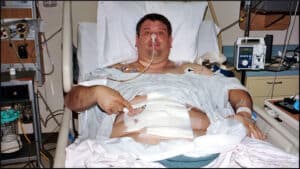Who Is Ready for Bariatric Surgery?

The illustration on this page is derived from the schedule of the World Obesity Federation Regional Conference, where Dr. Pretlow is on today’s program. As for his past public appearances, they may be explored from this link to a “roundup” page. Readers may also consult the right-hand side of the Childhood Obesity News home page for a collection of presentations viewable via Adobe Flash Player.
This series of posts looks back over the development of thought about weight-loss surgery for children and adolescents. Perhaps because about 70% of its people are obese, Saudi Arabia is becoming one of the world centers of bariatric surgery, and in fact holds one of the four esteemed registries of adolescent bariatric surgery.
There, obesity affects many more women than men, and it causes an estimated 20,000 deaths per year. By coincidence, around 20,000 weight-loss surgeries are performed every year. The country’s 2018 move was to add weight-loss surgery to the options available under its citizens’ standard insurance policy. A staff writer for Alarabiya.net explains,
Although insurance companies will have to bear a large cost to carry out the new insurance policy decision, they will save on having to cover other treatments that accompany obesity like diabetes, stress and many other diseases.
An uncredited writer for NDTV.com enumerates the steps for evaluating the suitability of any patient for interventions of this kind. First, they need to be aware of the risks and possible side effects, which are not trivial. The big question is, will the benefits outweigh the risks? The screening process is extensive, involving a whole team of professionals including surgeon, psychologist, and dietician.
First, the prospective patient’s entire history is reviewed. What weight-loss measures have been tried? What kind of nutritional standards has this person been following? What kind of stress situation is this person in the midst of? How motivated is this individual? Motivated enough to accept and stay within the limits of a very, very different kind of life?
Next, as this author states, and it is impossible to emphasize these concepts too much, “Obesity is also a result of an underlying mental health condition… Substance abuse, binge-eating disorder, major depression, schizophrenia and severe bipolar disorder may be responsible.”
More steps to patient eligibility evaluation
A very complete medical exam has to be completed. Important factors are the patient’s medications as well as general condition and existing co-morbidities. Nobody wants to make things worse with possible complications like nutritional deficiencies, kidney stones, liver disease, heart malfunction, and blood clots.
The age of eligibility depends on several factors including an individual surgeon’s standards. One doctor may decline a case that leads to operating on a 2-year-old, but another will be found. Even after taking a case, the doctor is alert to the possibility that surgery will have to be delayed or cancelled.
A patient is supposed to be losing weight by traditional means, during this evaluation period, and one who gains instead may very well be refused the surgical remedy. But, again, if the patient has the means to pay, another clinic can always be found.
Your responses and feedback are welcome!
Source: “Why is Saudi Arabia designating $133 million to cover weight loss surgeries?,” Alarabiya.net, 02/04/18
Source: “Thinking Of Getting A Bariatric Surgery? Read This First!,” NDTV.com, 10/18/18
Image by World Obesity Federation Regional Conference










 FAQs and Media Requests:
FAQs and Media Requests: 











